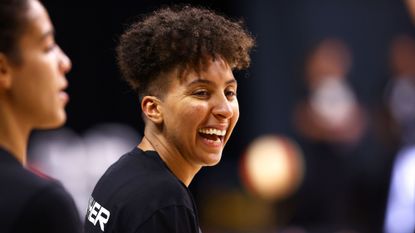
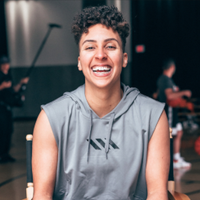
Glennon Doyle has a quote in her book Untamed that reads, “We are mugs filled to the brim, and we keep getting bumped. If we are filled with coffee, coffee will spill out. If we are filled with tea, tea will spill out. Getting bumped is inevitable. If we want to change what spills out of us, we have to work to change what’s inside us.”
This past year has been one of perpetual bumps, showing us all just how much work we have to do to change what spills out. We have witnessed kneeling during the anthem in sports become the norm, corporations co-opting Black Lives Matter as a badge of honor, droves of people in the streets protesting for dignity and life, and police budgets reduced in major cities like Los Angeles. Things that would have been inconceivable just a short time ago. But as we have started to collectively understand, we can’t expect to arrive at our destination and kick up our feet—we must continue to keep our foot on the gas.
As someone who lives at the intersection of many identities, I have grown accustomed to having to put aside one piece of myself to fight for another. I have stood at center court and fought for racial justice, negotiated groundbreaking collective bargaining agreements (CBAs) within the WNBA, and spoken out for LGBTQ+ rights over and over again. So when I watched President Biden sign the executive order that made clear that this new administration would protect all LGBTQ+ people under federal civil rights laws, a part of me that is so often put on a shelf felt the warmth of light.
Shortly afterwards, I experienced something else I have grown accustomed to: backlash. If you play women’s sports, you know online trolling all too well. If you speak out on race, you’ve been there, done that. If you are open about the love for your wife, you learn to click “block” and move on. But when you vocalize the most basic support for the humanity of your trans community, a new level of hate surfaces. The piping hot coffee that spills out of these mugs is filled with unaddressed work within our culture. Fear of and misconceptions about and downright contempt for trans people are everywhere. And somehow right now, this fear of trans people and trans bodies has zeroed in on trans people belonging in sports.
Yes, trans people belong in sports. Yes, I belong in sports. Can we please stop asking if peoples existence is valid cause that’s what you’re doing by debating if we “belong” or not.January 28, 2021
The use of “protecting women in sports” as a cloak for excluding trans women would be comical if it wasn’t so painful. There are renewed calls to police the bodies of women and girl athletes by excluding girls who are trans from participating on school athletic teams. As if, somehow, we can protect women and girls if we just exclude the ones who some believe are “too much like boys” and are “given an unfair competitive advantage” (for the record, this has not been proven). But this is the very thing that has harmed so many athletes—both cisgender and transgender—in women’s sports: the idea that our bodies are somehow fair game for scrutiny, debate, and intrusion. It is this scrutiny that is a threat to women’s sports—not the presence of trans women and girls. We must ask ourselves the critical question: Why are trans girls and women being targeted the most?
Many of those most vocally opposed to trans women have not advocated for an expansion of media coverage for women’s sports, increased resources and marketing for women’s sports, and investment in sports programs for women and girls around the country. They are not wearing our jerseys or attending our games. Instead, they are weaponizing our existence to hurt others. These people want to keep women in their place and then use us as swords to cut people who pose no threat to the advancement of our sport.
This is the very thing that has harmed so many athletes—both cisgender and transgender—in women’s sports: the idea that our bodies are somehow fair game for scrutiny, debate, and intrusion.
As a young child, I lived on the basketball court. Whether it was playing on the concrete slab in my backyard or at the local community center, or traveling for club team games, basketball gave me a safe haven from anything and everything that was going on around me. It didn’t matter who was there: We laced up our shoes and played. Ironically, I received the most praise from those around me when I played (and won) against the boys. In sports, we celebrate competitive advantage—it’s literally the reason we love sports so much. We love to watch A’ja Wilson or Lebron James out speed, out muscle, and out craft their opponents. But especially in our formative years, young people join sports teams for a sense of community—for a sense of belonging. What message are we giving to young trans people when we say you can’t participate? It’s simple: You are denying our existence by telling us we don’t belong.
Stay In The Know
Marie Claire email subscribers get intel on fashion and beauty trends, hot-off-the-press celebrity news, and more. Sign up here.
I’m usually not scared to share news publicly but the amount of hate, myths & ignorance actually had me debating sharing this joy. I had Top Surgery! I’m feeling free & euphoric in my body & want Trans people to know and see that we’ve always existed & no one can erase us! 🏳️⚧️✊🏽❤️ pic.twitter.com/6ERDPoQGwbJanuary 29, 2021
I have devoted my life to women’s sports. I care about athletes in women’s sports, and our future success. Make no mistake, the fight to keep trans people out of sports is about power and control, not the protection of cis women in sports. After all, who is really under attack here? Just look at the various states across the country, like Montana, Oklahoma, and Tennessee, trying to pass bills to stop trans youth from participating in sports, from being able to use the restroom, and from having access to lifesaving health care.
There can be no celebration of women’s sports without celebrating all the women and girls who love sports—including trans women and girls. Under no circumstances can we abide by segregating trans athletes, policing their bodies, and then claiming it somehow serves the larger fight for gender justice. In that game, we all lose.
If you want to help support trans rights, consider donating to organizations like the ACLU, Gays and Lesbians Living in a Transgender Society (G.L.I.T.S.), The Transgender Law Center, and The Okra Project.
RELATED STORY

Selected 9th overall in the 2013 WNBA Draft, Layshia is currently the point guard for the New York Liberty. Recently re-elected to a second term as WNBPA Vice President, Layshia helped negotiate a groundbreaking CBA Agreement that will serve as a bedrock for women’s professional sports leagues moving forward. A current member of both 5x5 and 3x3 National Team pools, Layshia captured gold with Team USA in the 2018 FIBA World Championships. In 2017, Layshia was named a WNBA All-Star, led the league in total assists, and broke the Atlanta Dream’s franchise record for assists in a single season. Clarendon was Cal’s leading scorer while in college where they led the Golden Bears to the first Final Four in school history. During their senior season, Clarendon was an All- Pac-12 first-team selection and the Pac-12 women’s basketball Scholar-Athlete of the Year. Clarendon is a noted social advocate, speaker, and writer, who is often asked to lend their voice and opinions on various social topics. She has been published in The Players’ Tribune, Mic, Esquire, and ESPN. In the off-season, you can find them on the sidelines providing color commentary for the Pac-12 Network.
-
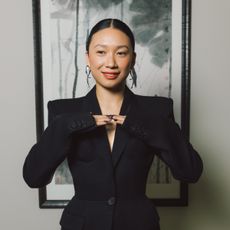 Jess Hong Enters Her Chaotic Era
Jess Hong Enters Her Chaotic EraShe was doing kids’ theater in New Zealand when she landed the leading role on Netflix’s epic ‘3 Body Problem.’ And now that the show is No. 1 on the streamer, her whole world is about to change.
By Jessica M. Goldstein Published
-
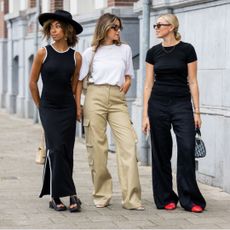 39 J.Crew, Reformation, and COS Items That Are Ideal for Spring Travel
39 J.Crew, Reformation, and COS Items That Are Ideal for Spring TravelSpring ready.
By Allyson Payer Published
-
 Taylor Swift Breaks Yet Another Music-Industry Record
Taylor Swift Breaks Yet Another Music-Industry RecordThis is pretty much the norm now, no?
By Meghan De Maria Published
-
 By Going Full "Trad Wife," Republicans Are Saying the Quiet Part Out Loud
By Going Full "Trad Wife," Republicans Are Saying the Quiet Part Out LoudSen. Katie Britt was picked to deliver the State of the Union rebuttal "as a housewife, not just a senator," one GOP lawmaker said.
By Danielle Campoamor Published
-
 36 Ways Women Still Aren't Equal to Men
36 Ways Women Still Aren't Equal to MenIt's just one of the many ways women still aren't equal to men.
By Brooke Knappenberger Last updated
-
 How New York's First Female Governor Plans to Fight for Women If Reelected
How New York's First Female Governor Plans to Fight for Women If ReelectedKathy Hochul twice came to power because men resigned amid sexual harassment scandals. Here, how she's leading differently.
By Emily Tisch Sussman Last updated
-
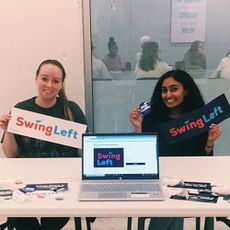 Why the 2022 Midterm Elections Are So Critical
Why the 2022 Midterm Elections Are So CriticalAs we blaze through a highly charged midterm election season, Swing Left Executive Director Yasmin Radjy highlights rising stars who are fighting for women’s rights.
By Tanya Benedicto Klich Published
-
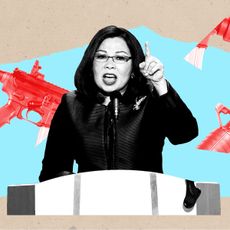 Tammy Duckworth: 'I’m Mad as Hell' About the Lack of Federal Action on Gun Safety
Tammy Duckworth: 'I’m Mad as Hell' About the Lack of Federal Action on Gun SafetyThe Illinois Senator won't let the memory of the Highland Park shooting just fade away.
By Sen. Tammy Duckworth Published
-
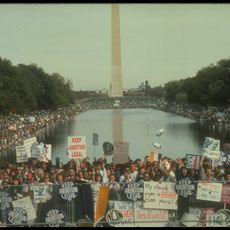 Roe Is Gone. We Have to Keep Fighting.
Roe Is Gone. We Have to Keep Fighting.Democracy always offers a path forward even when we feel thrust into the past.
By Beth Silvers and Sarah Stewart Holland, hosts of Pantsuit Politics Podcast Published
-
 Current Gun Control Policies Are Ableist
Current Gun Control Policies Are Ableist"Solutions" like active shooter drills and arming more people put the rights of gun owners above the rights of America's most vulnerable, including disabled people like myself.
By Heather Tomko Published
-
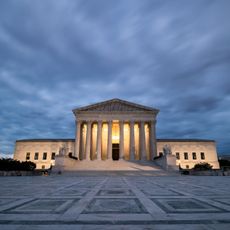 The Supreme Court's Mississippi Abortion Rights Case: What to Know
The Supreme Court's Mississippi Abortion Rights Case: What to KnowThe case could threaten Roe v. Wade.
By Megan DiTrolio Published